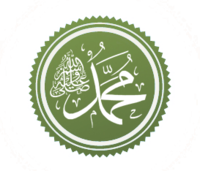Na`at
| Part of a series on |
| Muhammad |
|---|
 |
Contents
History
It is difficult to trace the history of Na'at khawani since no authenticated record of when it was initiated can be found. One early author, Hassan, was known as Shair-e-Darbaar-e-Risalat. Even before accepting Islam he was a poet, but after embracing Islam he gave a new turn to his poetry and started writing Na'ats in honor of Muhammad.[2] He was famous for his poetry that defended Muhammad in response to rival poets that attacked him and his religion. Therefore, Hassan is known as the first sana-khawaan (naat reciter) of that time. After that many a poet followed this trend and totally dedicated themselves towards writing of nNats.Tala' al Badru 'Alayna, a song sung to Muhammad during his completion of migration to Medina in 622 CE,[3] is believed to be one of the earliest naats.
Language
Commonly the term Naat-Shareef (exalted poetry) is reserved and used for poetry in the praise of Muhammad written in Pashto, Bengali, Urdu, English, Turkish, Persian, Arabic, Punjabi and Sindhi Language.In Arabic, Naat is usually called madih (praise) or Nasheed (poetry), although the latter can describe any type of religious poetry.
Urdu Naat Anthologies
- Hadaiqe Bakshish[1] by Ahmad Raza Khan
- Wasail e Bakhsish[2] by Muhammad Ilyas Qadri
- Farsh Par Arsh by Syed Muhammad Muhaddis Kichauchawi
- Tajalliyat by Syed Waheed Ashraf
Urdu Naat Poets
Urdu Naat Singers
- Mushtaq Qadri
- Syed Fasihuddin Soharwardy
- Muhammad Owais Raza Qadri
- Asad Raza Attari
- Siddiq Ismail
- Khursheed Ahmad
- Abdul Rauf Rufi
See also
References
- ""Islam and Islamic History in Arabia and the Middle East""., islamicity.com website, Retrieved 10 Jan 2017
External links
- https://www.youtube.com/watch?v=0Rxhgd9Xv5A, A popular 'Naat' written by Maulana Zafar Ali Khan and recited by Mehdi Hassan on YouTube, Retrieved 12 Jan 2017
Comments
Post a Comment